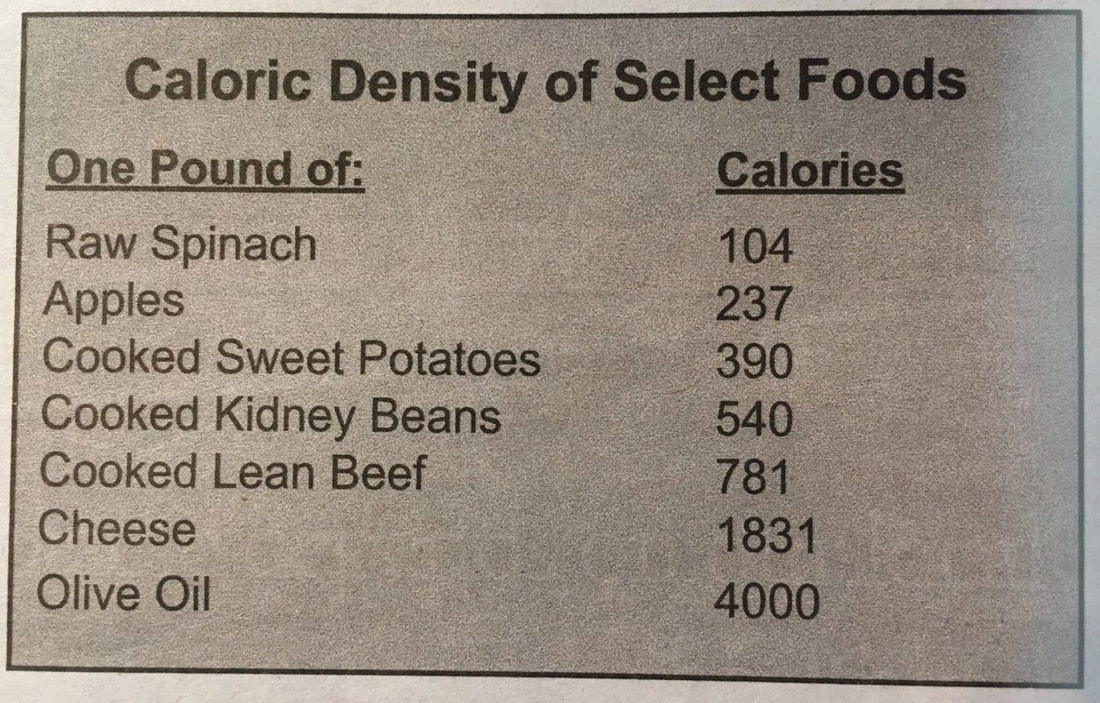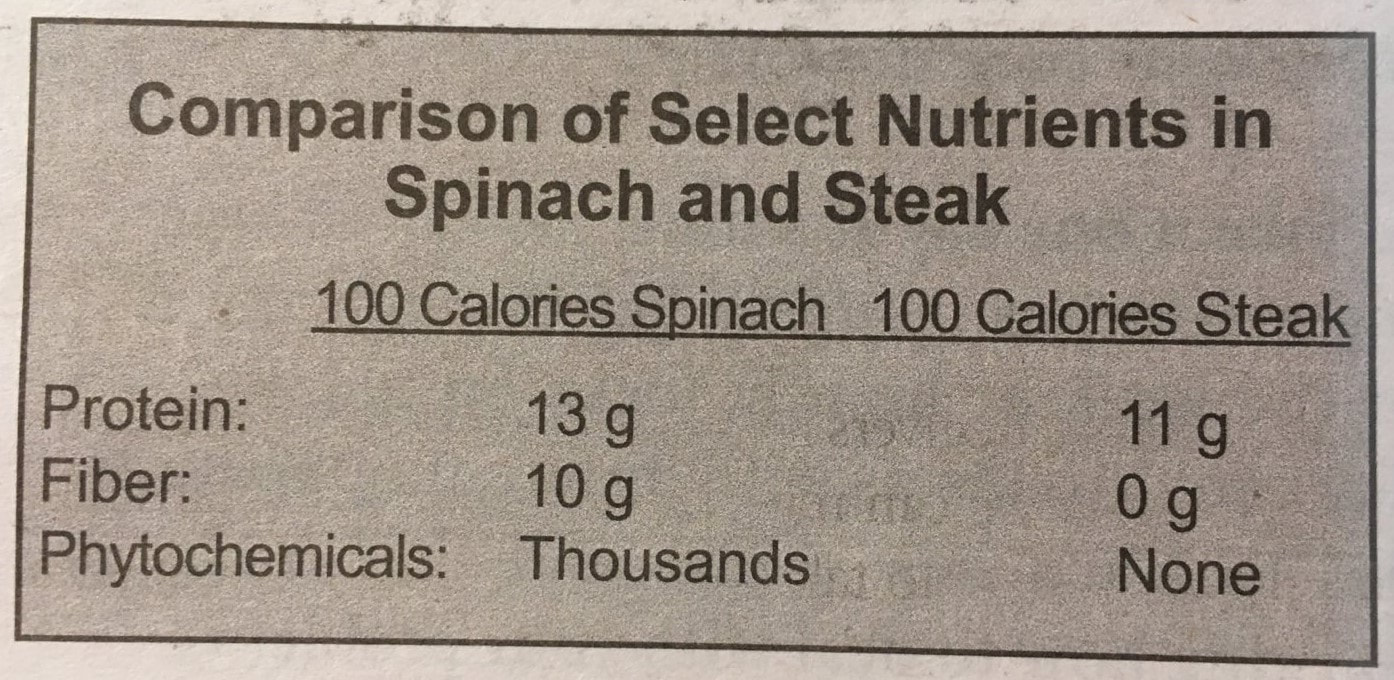This is the fifth edition of my monthly column addressing the plant-based lifestyle. Previously I have discussed the concept of caloric density, and how using it to inform which foods you should eat the most of can improve your health, and why oil -- even quality olive oil may not be a good addition to your diet,
If you missed those columns, they are archived here below this one
So now we can turn our attention to what is probably the most often expressed question I hear from people who aren’t sure that eating plant-based might be one of the smartest things they could do to improve their health and well-being:
Where do you get your protein?
The simple, most intuitive answer is this: From the same place that elephants, cows, gorillas and rhinoceroses do – from plants!
It is virtually impossible to design a diet comprised primarily of vegetables, whole grains and beans that is protein deficient – as long as it includes enough calories to meet their energy needs.
For the most part an actual “protein deficiency” is diagnosed only in cases where people are simply not eating enough calories – such as when they are starving. The fact is, that in America, far more people are suffering from chronic conditions and premature death linked with OVER consuming protein than under consuming it. (The risk of heart disease, some cancers and diabetes increases with an increase in the consumption of protein --- specifically animal protein.)
But understanding the history of why Americans ever became so obsessed with the concept of protein in the first place can be very helpful to calming down anxiety over getting enough protein and that is why I’d encourage you to read any of the books by Dr. T Colin Campbell to help you understand this history and put to rest any concerns about this that you might have. Campbell is a nutritional biochemist who rose to the top ranks of elite scientists involved in public policy, only to be shunned when he, “followed the science” instead of the money. Campbell’s story will help you to appreciate the degree to which the public’s biased view regarding the protein issue has been driven by industry profits.
But some sources of protein are far better for us than others.
One of the most startling findings of Campbell’s research (which the NY Times called the Grand Prix of nutritional epidemiology) was that animal protein had the ability to “turn on” the growth of cancers, while plant protein did not have this effect.
Here is another angle to consider, what is the period of most rapid human growth? When are we supposed to double our body size in less than a year? It’s in infancy. And what is nature’s most perfect food to make this happen...it’s human breast milk right? Did you realize that in mother’s milk, only 5% of the calories are from protein. So if nature designed us to thrive during the time of our most rapid growth, consuming only 5% of calories from proteim, how could it possibly be that we require large amounts of protein at most other times in our life?
Registered Dietitian Brenda Davis – a world recognized expert in plant-based nutrition, recommends that adults on average get about 0.8 grams of protein per kg of body weight. This comes out to about 46 grams of protein for a 126 lb woman and 56 grams of protein for a 154 lb man, though she does suggest that adults over the age of 65 might benefit from increasing this about 20% as they can be less efficient in absorbing protein. Athletes that train hard also might benefit from a little more protein as well.
In addition to increasing cancer risk, protein from animal sources tends to come loaded with more toxins (because eating higher on the food chain means you are consuming the life time exposure of DDT, and many other pesticides and plastics that that animal concentrated in his or her tissues) which may also impact the immune system, hormones and diabetes risk.
Animal protein also appears to increase overall levels of inflammation in the body through multiple different mechanisms, one of which is the fact that eating meat, dairy and eggs will select for gut microbes that up-regulate inflammation in the body. In fact it’s been shown that simply eating a whole food plant based diet dramatically changes your gut microbiome to include more microbes that down-regulate inflammation. This is often experienced by people as a reduction in pain from things many causes including arthritis and angina.
If you missed those columns, they are archived here below this one
So now we can turn our attention to what is probably the most often expressed question I hear from people who aren’t sure that eating plant-based might be one of the smartest things they could do to improve their health and well-being:
Where do you get your protein?
The simple, most intuitive answer is this: From the same place that elephants, cows, gorillas and rhinoceroses do – from plants!
It is virtually impossible to design a diet comprised primarily of vegetables, whole grains and beans that is protein deficient – as long as it includes enough calories to meet their energy needs.
For the most part an actual “protein deficiency” is diagnosed only in cases where people are simply not eating enough calories – such as when they are starving. The fact is, that in America, far more people are suffering from chronic conditions and premature death linked with OVER consuming protein than under consuming it. (The risk of heart disease, some cancers and diabetes increases with an increase in the consumption of protein --- specifically animal protein.)
But understanding the history of why Americans ever became so obsessed with the concept of protein in the first place can be very helpful to calming down anxiety over getting enough protein and that is why I’d encourage you to read any of the books by Dr. T Colin Campbell to help you understand this history and put to rest any concerns about this that you might have. Campbell is a nutritional biochemist who rose to the top ranks of elite scientists involved in public policy, only to be shunned when he, “followed the science” instead of the money. Campbell’s story will help you to appreciate the degree to which the public’s biased view regarding the protein issue has been driven by industry profits.
But some sources of protein are far better for us than others.
One of the most startling findings of Campbell’s research (which the NY Times called the Grand Prix of nutritional epidemiology) was that animal protein had the ability to “turn on” the growth of cancers, while plant protein did not have this effect.
Here is another angle to consider, what is the period of most rapid human growth? When are we supposed to double our body size in less than a year? It’s in infancy. And what is nature’s most perfect food to make this happen...it’s human breast milk right? Did you realize that in mother’s milk, only 5% of the calories are from protein. So if nature designed us to thrive during the time of our most rapid growth, consuming only 5% of calories from proteim, how could it possibly be that we require large amounts of protein at most other times in our life?
Registered Dietitian Brenda Davis – a world recognized expert in plant-based nutrition, recommends that adults on average get about 0.8 grams of protein per kg of body weight. This comes out to about 46 grams of protein for a 126 lb woman and 56 grams of protein for a 154 lb man, though she does suggest that adults over the age of 65 might benefit from increasing this about 20% as they can be less efficient in absorbing protein. Athletes that train hard also might benefit from a little more protein as well.
In addition to increasing cancer risk, protein from animal sources tends to come loaded with more toxins (because eating higher on the food chain means you are consuming the life time exposure of DDT, and many other pesticides and plastics that that animal concentrated in his or her tissues) which may also impact the immune system, hormones and diabetes risk.
Animal protein also appears to increase overall levels of inflammation in the body through multiple different mechanisms, one of which is the fact that eating meat, dairy and eggs will select for gut microbes that up-regulate inflammation in the body. In fact it’s been shown that simply eating a whole food plant based diet dramatically changes your gut microbiome to include more microbes that down-regulate inflammation. This is often experienced by people as a reduction in pain from things many causes including arthritis and angina.






 RSS Feed
RSS Feed
